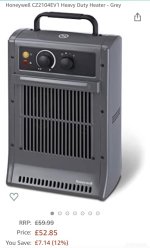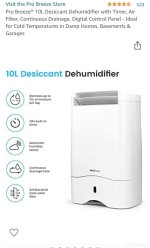I expect that some of you have already done this, so I'm hoping for some pointers, please.
My garage gets too cold in winter (zero degrees Celsius - I don't think that it has ever dropped lower, though) and it can become too humid. The humidity is caused, I think, because I have a really wide roller shutter door so when it's open and humid outside it comes right on in! That and wet cars are sometimes unavoidable.
It's a detached construction and the ground floor measures approximately 6m x 8m. The outer wall is facing brick and the inner is 100mm Durox Supablock (according to spec) - it's painted inside, not plasterboard. There's a 50mm cavity that should be insulated (again, according to spec). There's an upstairs with a pitched roof and three roof windows. Downstairs has a window and door on one side and the large roller shutter on the other (it must be c. 5m wide).
I'd like to stop the temperature dropping below about 10 degrees - it hasn't done that yet this year, with no heating in place. I also want to drop the humidity to about 60% (it can get close to 90% when conditions are adverse). I have an electrical supply, cold water, and drainage up there.
I was considering an Ebac dehumidifier with a constant drainage option. Not sure which one yet, but probably one of the more expensive ones - I'll seek Ebac's advice, too. https://www.ebac.com/dehumidifiers/range/
For heating, I think that two wall mounted electric panel heaters downstairs makes sense. I've got plenty of plug sockets already installed so hope to just mount them and plug them in. I've got no idea where to start on that one - heaters seem to vary hugely in terms of price and function. I'd like automatic temperature control and basic scheduling (I probably don't even need days of the week, just a clock/timer function).
I'm not working to a strict budget so I can spend a bit more on a quality solution but also I don't need to spend money on superfluous features - for example I am not bothered about having a mobile app for my panel heaters! :lol:
Any suggestions/help gratefully received - thanks.
My garage gets too cold in winter (zero degrees Celsius - I don't think that it has ever dropped lower, though) and it can become too humid. The humidity is caused, I think, because I have a really wide roller shutter door so when it's open and humid outside it comes right on in! That and wet cars are sometimes unavoidable.
It's a detached construction and the ground floor measures approximately 6m x 8m. The outer wall is facing brick and the inner is 100mm Durox Supablock (according to spec) - it's painted inside, not plasterboard. There's a 50mm cavity that should be insulated (again, according to spec). There's an upstairs with a pitched roof and three roof windows. Downstairs has a window and door on one side and the large roller shutter on the other (it must be c. 5m wide).
I'd like to stop the temperature dropping below about 10 degrees - it hasn't done that yet this year, with no heating in place. I also want to drop the humidity to about 60% (it can get close to 90% when conditions are adverse). I have an electrical supply, cold water, and drainage up there.
I was considering an Ebac dehumidifier with a constant drainage option. Not sure which one yet, but probably one of the more expensive ones - I'll seek Ebac's advice, too. https://www.ebac.com/dehumidifiers/range/
For heating, I think that two wall mounted electric panel heaters downstairs makes sense. I've got plenty of plug sockets already installed so hope to just mount them and plug them in. I've got no idea where to start on that one - heaters seem to vary hugely in terms of price and function. I'd like automatic temperature control and basic scheduling (I probably don't even need days of the week, just a clock/timer function).
I'm not working to a strict budget so I can spend a bit more on a quality solution but also I don't need to spend money on superfluous features - for example I am not bothered about having a mobile app for my panel heaters! :lol:
Any suggestions/help gratefully received - thanks.

